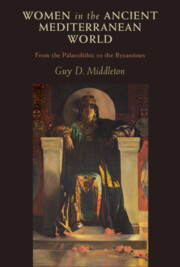Book contents
- Women in the Ancient Mediterranean World
- Women in the Ancient Mediterranean World
- Copyright page
- Dedication
- Epigraph
- Contents
- Preface
- Acknowledgements
- Timeline
- Historical Contexts
- Introduction
- Part I The Deep Past
- Part II The Bronze Age
- Part III The Iron Age
- 12 Naunakhte
- 13 Herse
- 14 Pkpupes
- 15 Atossa
- 16 The Princess of Vix
- 17 Aristonice
- 18 Neaira
- 19 Phanostrate
- Part IV The Hellenistic Worlds
- Part V The Age of Empire
- Notes
- Select Bibliography
- Index
12 - Naunakhte
from Part III - The Iron Age
Published online by Cambridge University Press: 19 January 2023
- Women in the Ancient Mediterranean World
- Women in the Ancient Mediterranean World
- Copyright page
- Dedication
- Epigraph
- Contents
- Preface
- Acknowledgements
- Timeline
- Historical Contexts
- Introduction
- Part I The Deep Past
- Part II The Bronze Age
- Part III The Iron Age
- 12 Naunakhte
- 13 Herse
- 14 Pkpupes
- 15 Atossa
- 16 The Princess of Vix
- 17 Aristonice
- 18 Neaira
- 19 Phanostrate
- Part IV The Hellenistic Worlds
- Part V The Age of Empire
- Notes
- Select Bibliography
- Index
Summary
In the third year of pharaoh Ramesses V, c. 1145 bc, an Egyptian woman called Naunakhte, who lived in the workers’ village of Deir el-Medina (Figure 12), went to her local court to explain her final will.1 It was her express wish to disinherit some of her eight surviving children, sons and daughters, because they had failed in their duty to care for her in her old age. In her words:
I am a free woman of the land of Pharaoh. I raised these eight servants of yours, and I outfitted them with everything that is usual for people of their character. Now look, I have become old, and look, they do not care for me. As for those who put their hands in my hand, to them I will give my property; [but] as for those who gave me nothing, to them I will not give any of my property.2
- Type
- Chapter
- Information
- Women in the Ancient Mediterranean WorldFrom the Palaeolithic to the Byzantines, pp. 113 - 118Publisher: Cambridge University PressPrint publication year: 2023

